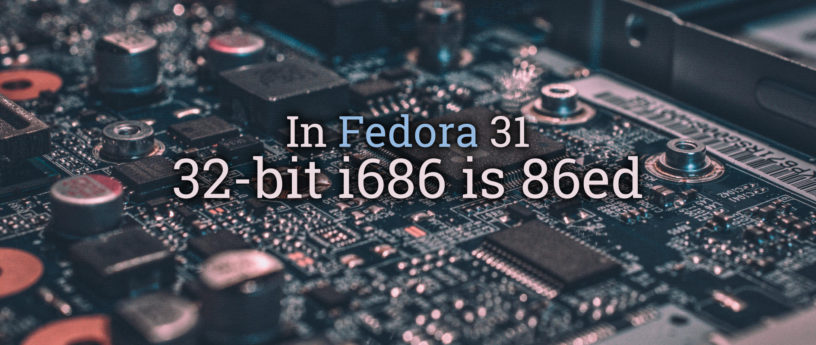The release of Fedora 31 drops the 32-bit i686 kernel, and as a result bootable images. While there may be users out there who still have hardware which will not work with the 64-bit x86_64 kernel, there are very few. However, this article gives you the whole story behind the change, and what 32-bit material you’ll still find in Fedora 31.
What is happening?
The i686 architecture essentially entered community support with the Fedora 27 release. Unfortunately, there are not enough members of the community willing to do the work to maintain the architecture. Don’t worry, though — Fedora is not dropping all 32-bit packages. Many i686 packages are still being built to ensure things like multilib, wine, and Steam will continue to work.
While the repositories are no longer being composed and mirrored out, there is a koji i686 repository which works with mock for building 32-bit packages, and in a pinch to install 32-bit versions which are not part of the x86_64 multilib repository. Of course, maintainers expect this will see limited use. Users who simply need to run a 32-bit application should be able to do so with multilib on a 64-bit system.
What to do if you’re running 32-bit
If you still run 32-bit i686 installations, you’ll continue to receive supported Fedora updates through the Fedora 30 lifecycle. This is until roughly May or June of 2020. At that point, you can either reinstall as 64-bit x86_64 if your hardware supports it, or replace your hardware with 64-bit capable hardware if possible.
There is a user in the community who has done a successful “upgrade” from 32-bit Fedora to 64-bit x86 Fedora. While this is not an intended or supported upgrade path, it should work. The Project hopes to have some documentation for users who have 64-bit capable hardware to explain the process before the Fedora 30 end of life.
If you have a 64-bit capable CPU running 32-bit Fedora due to low memory, try one of the alternate desktop spins. LXDE and others tend to do fairly well in memory constrained environments. For users running simple servers on old 32-bit hardware that was just lying around, consider one of the newer ARM boards. The power savings alone can more than pay for the new hardware in many instances. And if none of these are on option, CentOS 7 offers a 32-bit image with longer term support for the platform.
Security and you
While some users may be tempted to keep running an older Fedora release past end of life, this is highly discouraged. People constantly research software for security issues. Often times, they find these issues which have been around for years.
Once Fedora maintainers know about such issues, they typically patch for them, and make updates available to supported releases — but not to end of life releases. And of course, once these vulnerabilities are public, there will be people trying to exploit them. If you run an older release past end of life, your security exposure increases over time as a result, putting your system at ever-growing risk.
Photo by Alexandre Debiève on Unsplash.






Kamil
I don’t really understand the title. I guess “86ed” is supposed to mean “dead”, for some unclear reason? Perhaps I’d get it if I were a native English speaker. But for important announcements, I’d recommend avoiding wordplay that is only clear to native speakers.
Ben Cotton
@Kamil, thanks for the reminder. We’ll be more careful in future articles.
Your understanding of the term is correct enough. It generally means discarded. Wikipedia has a few possible explanations of the term’s origin.
Jens Petersen
Apparently it is American slang.
Kamil
Ah, thanks, Ben. Now it makes much more sense.
Stuart D Gathman
Inside puns and jokes are no problem when there are hyperlinks for the uninitiated. No need to leave out a good pun when clicking on “86ed” can lead to an explanation.
Mihai
I am not a native english speaker and the title is far from a conundrum.
The pun was well crafted and it did made me chuckle 🙂
Silvia Sanchez
Well, I am native speaker and I didn’t get it until I read the comments. So yeah, I think it would be better to avoid puns that are not easily understood by everyone.
Bryan J Smith
https://wikipedia.org/wiki/86_(term)
Maciej
Is there a way to request a lib? Unfortunately I still need libstdc++.so.5 to run “snx SSL Network Extender”, other libs to run this thingie are still present in 31, but this one. Installing rpm from 30 still works though. I know, I know… 🙂
Mike
Can you give some pointers on how to set up and use multilib for running 32bit applications under 64 bit OS?
Roger
The use of the term ’86ed’ was entirely appropriate. Do not ‘dumb-down’ an article for any particular audience. It does no harm to non-native English speakers when they are introduced to English idioms. English is a big language that has welcomed many other words and expressions from other languages into everyday use. It is a challenge to everyone.
Silvia Sanchez
So if they do not understand, they do not matter?
That’s not very community spirit, me thinks.
J-Money
Who’s saying they don’t matter? Have you ever come across a word you don’t know and looked it up? This is the same thing. By your logic nobody should ever use a word that somebody might not know. Ridiculous.
Anonymous
Semi unrelated, but speaking of removal of packages, some packages got removed from Fedora 31 for another reason, python2. PlayOnLinux and Bleachbit are examples of ones I use on a daily basis. It’s a shame, but for now I use the Fedora 30 builds of PlayOnLinux and Bleachbit and they work fine for now. Is there any chance they could get added back to the repos? If not, is there a chance that they will stop working in the future?
Luya Tshimbalanga
Python2 is reaching end of life on January 1, 2020.
J-Money
I gotta say this article title was genius. Bravo!
Anonymous Coward*
Totally agree! This headline is attention-grabbing, funny, and with a cultural background. So in one word, it’s smart! This is what makes us remember a story.
This is the best headline I’ve read so far in Fedora Magazine and we’d like to see more like this!
I’m not a native speaker and I believe this is a good opportunity to learn more about the language and the culture.
We can look at the brilliant tech news site The Register. Plenty of British humor, plenty of idioms, slang and cultural references from all over the English world. How do they solve the comprehension conundrum for their audience? Some writers add asterisks to a footnote, others give a short explanation or a link within the article. Because of course important information has to be clear to everyone.
Tech news without a spoon of smart fun is boring…
the collective anonymous handle for commentards on The Register (https://www.theregister.co.uk/)
Manfred
Where is it possible to have some more info on the koji i686 repository?
Andrew Marchant
Don’t worry about the slang in the title, it means nothing to English-speaking Right-Pondians* either! Shame to drop 32-bit (I still miss 8 bit) but usable 64 bit machines are cheap these days so it’s time to move on.
See:
https://www.urbandictionary.com/define.php?term=right-pondian
Vernon Van Steenkist
Very disappointing. I wish this was stated when I installed Fedora 30 LXQT on my 32 bit X86 netbook and wasted all the time with configuration – especially with having to select an alternate Network Manager repository. If I had known. I would have stuck with Debian. Also, it would have been great if you suggested alternative 32 bit X86 Linux distributions.
Manfred
I am sad about this too, I wish there were some way to keep i686 going.